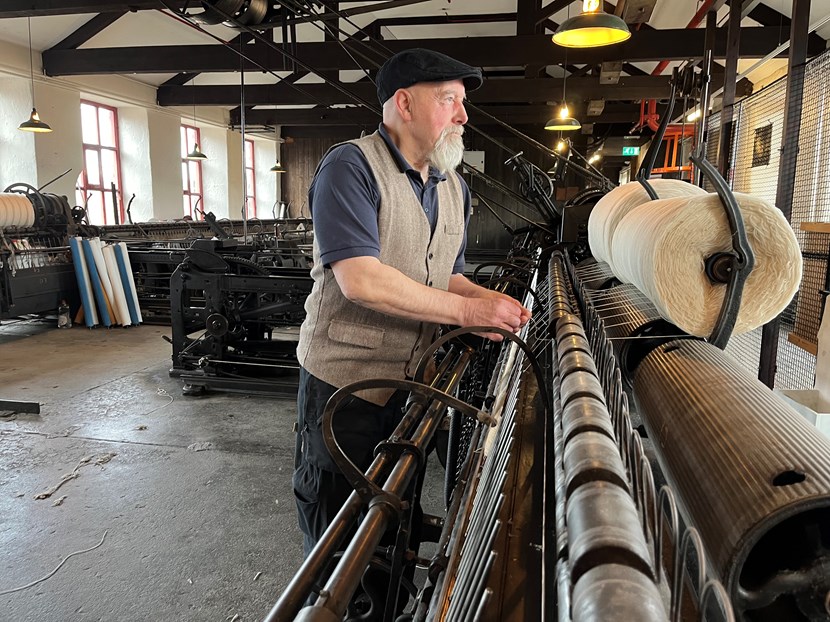
20 Feb 2023
Museum’s old school mule is still alive and kicking
After more than a century spinning the finest Yorkshire yarns, it’s a piece of vintage textile tech which has certainly stood the test of time.
But it turns out even Leeds Industrial Museum’s remarkably resilient Victorian mule isn’t completely immune from wear and tear.
One of an impressive pair, the mule, which usually runs several times a week for visitor demonstrations, suffered a mystery mechanical problem just before Christmas which sadly put it out of action.
Unable to get their mechanised marvel working again, the museum team drafted in local textile machinery expert Derek Bird who undertook the tricky task of examining the mule’s intricate inner workings to try and discover the source of the problem.
Fortunately, Derek, whose first job was as a textile machinery maker at Keighley’s Prince-Smith and Stells Ltd, proved more than up to the job and, after a bit of pondering followed by some expert care, attention and advice, the incredible piece of equipment is now finally back up and running.
Derek, who has volunteered with a number of museums across the region helping to preserve and restore their equipment, said: “The machine at Armley is very different in its mechanisms. All self-acting mules have a blocking system, that prevents two motions coming into action at the same time or out of turn, as was happening with this machine. Sometimes these get out of adjustment due to wear and 'striking through', the technical term for what was happening, can occur.
“My real passion is working with machinery and I was for many years a volunteer at Bradford Industrial Museum, restoring the Noble Comb, among other work there. So now in retirement I’m returning to the work I did as an apprentice at Prince-Smith's. I also work as a volunteer at Calderdale Industrial Museum, and have recently been involved with Kirklees Museums. There’s never a dull moment at present.”
John McGoldrick, Leeds Museums and Galleries curator of industrial history added: “The mule is a truly unique and astonishingly complex piece of machinery, and its longevity is a testament to the quality of workmanship which went into its creation more than 120 years ago.
“Like most old machines, it can be cranky at times, but the museum isn’t quite the same without it, so we’re incredibly grateful to Derek for lending us his considerable knowledge and expertise and for getting it back in working order. We’re sure visitors will be excited to see it in action once again.”
Originally made in 1904 by Platt Brothers and Co. Ltd, the mule’s 300 spindles were designed to spin fibres into yarn, filling the region’s turn-of-the-century textile mills with a distinctive cacophony of noise.
Museum records show the mule was once owned by James Ives and Co. Ltd. of Leafield Mills, Yeadon, one of eight purchased by mill owner James Ives in 1903 and delivered the following year.
Even today, the quality of the fabric it can produce is so high that the machine is still used for bespoke commercial blanket production and baize for snooker tables.
The machine’s twin, which sadly no longer operates, dates from 1871, and is thought to be the oldest of its kind anywhere in the world.
The museum itself was once the world’s largest woollen mill. Built in at least the 1600s, the site was bought in the late 1700s by Colonel Thomas Lloyd, a Leeds cloth merchant, who expanded operations dramatically, so much so that Armley was soon the world’s biggest.
The original buildings later burned down, but were rebuilt in 1805 by noted woollen merchant Benjamin Gott, owner of a number of mills in the area.
Although production ended in 1969, the site reopened as Leeds Industrial Museum in 1982 and today showcases an incredible array of vintage machinery including traditional looms and other textile equipment.
Councillor Jonathan Pryor, Leeds City Council’s executive member for economy, culture and education, said: “The textile industry is one of the cornerstones of Leeds’s history and heritage and played a massive role in establishing the city as an economic powerhouse.
“It’s incredible that we have such a remarkable collection of vintage machinery in the city which tells the story of that industry and demonstrates the spirit of ingenuity and innovation which drove it to such heights.”
For more information visit: https://museumsandgalleries.leeds.gov.uk/leeds-industrial-museum/
ENDS
For media enquiries contact:
Leeds City Council Communications team
communicationsteam@leeds.gov.uk